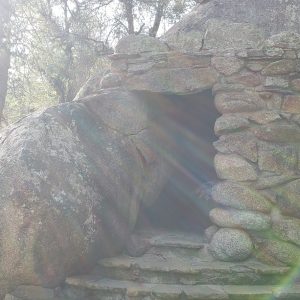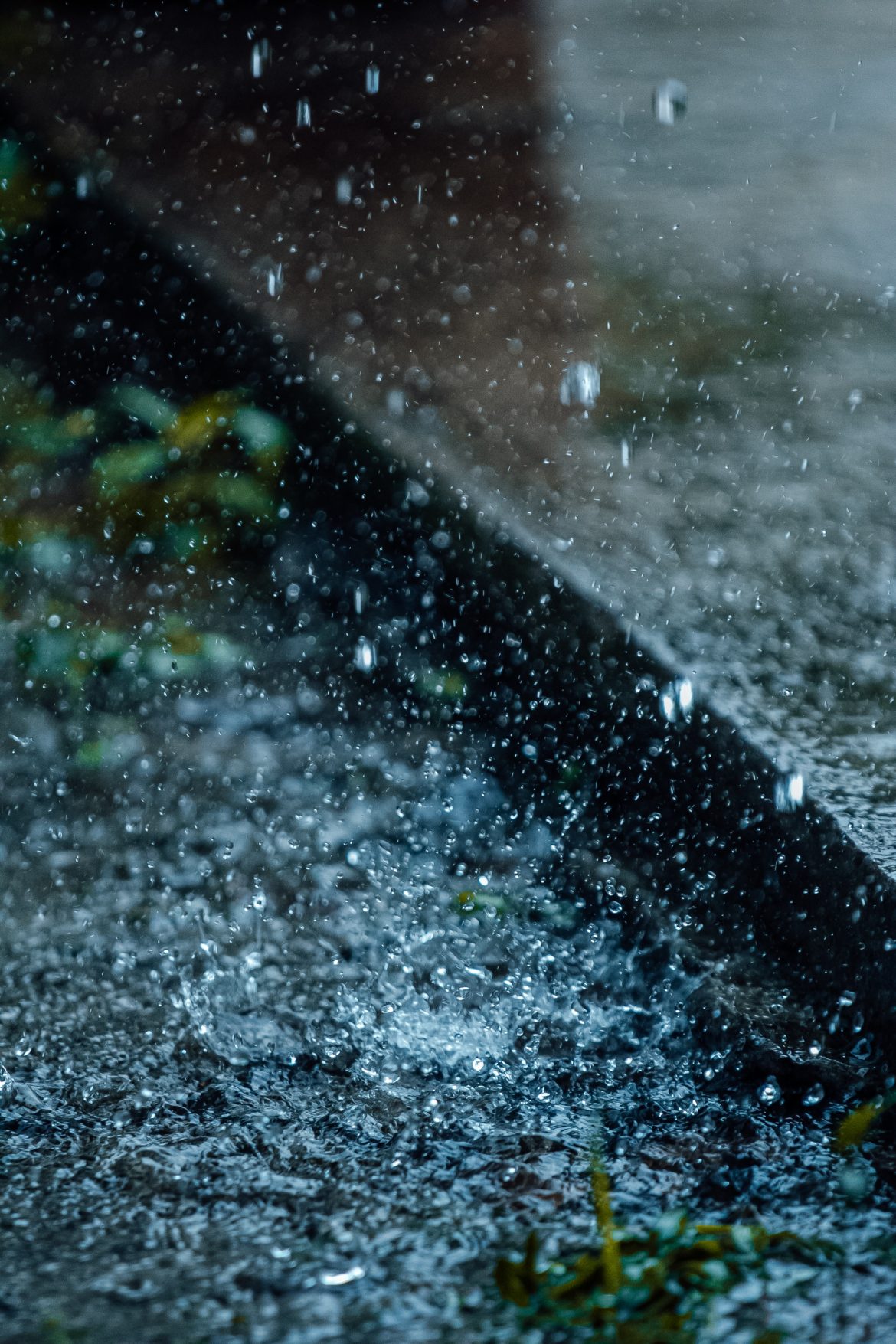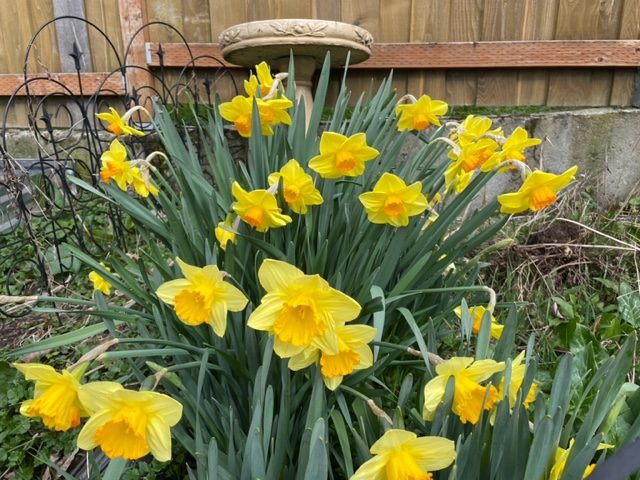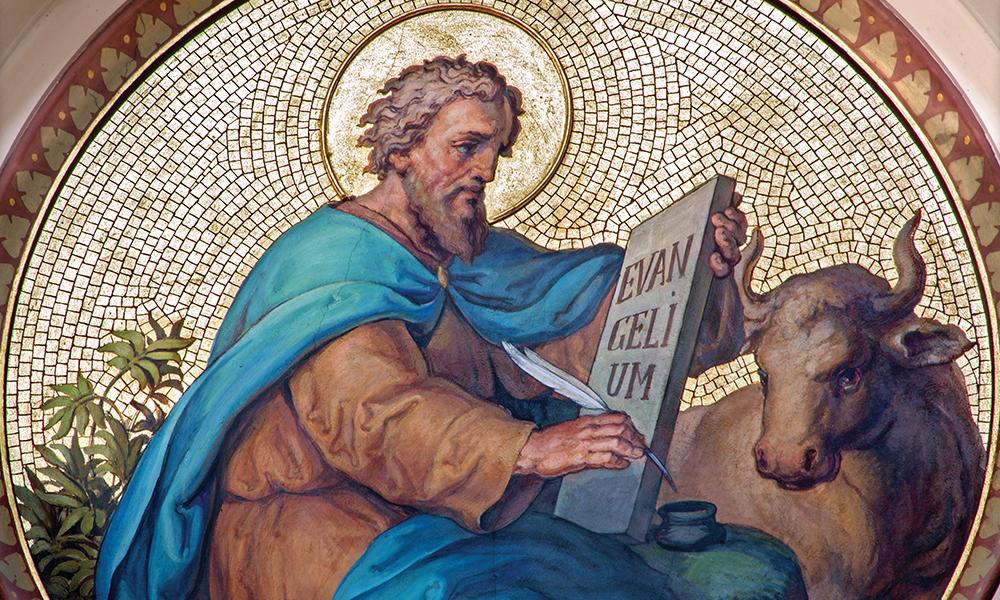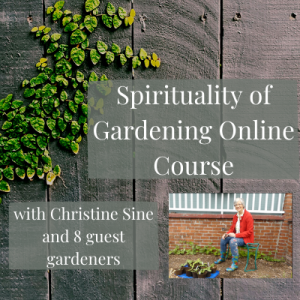We have a sick puppy, and over the last few days I saw far more of the night sky than I wanted to. I experienced it in the pouring rain, on a chilly but cloudy morning and on a clear, frosty morning with a thin slither of moon shining brightly above me. Our dog is better now and I won’t miss my trips outside in the middle of the night, but I am very grateful for these unexpected glimpses of the glory of God I experienced over these days. Creation speaks to us of the wonder of God, and the Creator’s glory shimmers in every aspect of the world around us.
Saturday’s retreat Preparing for the Garden Walk of Holy Week was a great success and many left with a renewed appreciation of the ways God’s story intertwines with the story of creation. As I mentioned last week: “As we approach the events of Holy Week this is particularly relevant. Earth participates in each step of the story. We see it in the waving of palms and Jesus’ entry to Jerusalem on a donkey, through the garden of Gethsemane to the crescendo of earthquakes and splitting tombs at the moment of Christ’s crucifixion, and on to Easter when life overcomes death and Jesus is proclaimed as the gardener of the new creation.” If you would be interested in purchasing a copy of the recording from this retreat please let us know.
I focus on the same theme in yesterday’s Meditation Monday – New Creation is Emerging. My growing concern for the devastation climate change is causing in many parts of our world as well as the destruction of species and habitats has me sounding this trumpet more loudly every day. “Climate change requires spiritual transformation. We need to transform our view of the Bible to see the ecological underpinnings of the story” and I should have added, our responsibility to be part of the answer. Over the next few weeks I plan to share some of the solutions that I believe are within reach of all of us. It may not feel that we can make much of a difference, but as all of us work together the drops each of us contribute will fill the bucket of change. “We can all make a difference in God’s world and move toward the completion of God’s new creation. which came into being at the resurrection of Christ. How exciting and yet how challenging that is.”
Our apologies for the misinformation on Saturday’s post: Luke’s Gospel in Poetry. This beautiful set of poems is not by Joy Lenton as originally said but by Jeannie Kendall. We don’t want you to miss this and the free download of the entire set of poetry through Luke that she has gifted us with. I am humbled by the beautiful gifts like this that our writers often gift us with. And if you are not too sure about the importance of poetry, make sure you read Catherine Lawton’s post Poetry Opens Our Hearts to God. As she says “Poetry, and all the feelings it represents, connects us to all of humanity’s longings and searchings for God. “
My favourite post from last week was Louise Conner’s The Art of Creation Among the Weeds. The art work that Mona Caron creates in the form of murals on buildings is both stunning and inspirational. Don’t miss this wonderful post. Lilly Lewin’s Lenten Pilgrimage posts, Part 1 posted on March 3rd, and the second part posted on Friday are also inspirational. I love the way that Lilly blends her personal experiences with the lessons she learns from god.
Holy Week is almost upon us so make sure you take advantage of the many resources we have available for the season. Here are some of my favourite links:
- Resources for Palm Sunday
- Let’s Get Creative With Our Palms
- Resources for Maundy Thursday
- Resources for Good Friday
- Resources for Celebrating Holy Week With Kids
- Resources for Easter Sunday
- Kid Resources for Easter
- Stations of the Cross Resource List
The are however many more links available on the Lent, Holy Week and Easter resource page.
Tom and I will once more be presenters at the Inhabit Conference: Building Together for the Future of the Church in the Neighborhood in Seattle on April 21-22. This is our favourite conference of the year and we would love it if you can join us.
Many blessings on you as we head towards Holy Week and the celebrations of what is at the centre of our faith.
Christine Sine
What restrictions are you struggling with today? Where do you feel bound?
Is it physical, in that you are not able to move or do the things that you once were able to do with ease?
Is it mentally as your mind just does not seem to recall or remember things like when you
were a youth?
Is it emotional in that feelings seem somewhat dull and even unfeeling
because of recent restrictions with covid or of your past?
Or is it spiritual as one feels bound by the things others demand, or say, are essential or one will never make it with
God?
In our world today and for me in our country in particular it seems that instead of
‘setting people free’ from the power of evil we seem to just wrap ourselves up as well as
try to wrap others in a different kind of binding/bondage. In John 11 we have the story of
Jesus raising Lazarus, His friend, from the dead.
But Lazarus needed to be unbound from the cloths of physical death so he could live.
A man was sick, Lazarus of Bethany, the town of Mary and her sister Martha. This
was the same Mary who massaged the Lord’s feet with aromatic oils and then wiped them
with her hair. It was her brother Lazarus who was sick. So the sisters sent word to Jesus,“Master, the one you love so very much is sick.”
4 When Jesus got the message, he said, “This sickness is not fatal. It will become an
occasion to show God’s glory by glorifying God’s Son.”
5-7 Jesus loved Martha and her sister and Lazarus, but oddly, when he heard that Lazarus
was sick, he stayed on where he was for two more days. After the two days, he said to hisdisciples, “Let’s go back to Judea.”
8 They said, “Rabbi, you can’t do that. The Jews are out to kill you, and you’re going
back?”
9-10 Jesus replied, “Are there not twelve hours of daylight? Anyone who walks in daylight
doesn’t stumble because there’s plenty of light from the sun. Walking at night, he mightvery well stumble because he can’t see where he’s going.”
11 He said these things, and then announced, “Our friend Lazarus has fallen asleep. I’m
going to wake him up.”
12-13 The disciples said, “Master, if he’s gone to sleep, he’ll get a good rest and wake up
feeling fine.” Jesus was talking about death, while his disciples thought he was talkingabout taking a nap.
14-15 Then Jesus became explicit: “Lazarus died. And I am glad for your sakes that I wasn’t
there. You’re about to be given new grounds for believing. Now let’s go to him.”
16 That’s when Thomas, the one called the Twin, said to his companions, “Come along. Wemight as well die with him.”
17-20 When Jesus finally got there, he found Lazarus already four days dead. Bethany was
near Jerusalem, only a couple of miles away, and many of the Jews were visiting Martha
and Mary, sympathizing with them over their brother. Martha heard Jesus was comingand went out to meet him. Mary remained in the house.
21-22 Martha said, “Master, if you’d been here, my brother wouldn’t have died. Even now, I
know that whatever you ask God he will give you.”
23 Jesus said, “Your brother will be raised up.”24 Martha replied, “I know that he will be raised up in the resurrection at the end of time.”
25-26 “You don’t have to wait for the End. I am, right now, Resurrection and Life. The one
who believes in me, even though he or she dies, will live. And everyone who lives believingin me does not ultimately die at all. Do you believe this?”
27 “Yes, Master. All along I have believed that you are the Messiah, the Son of God who
comes into the world.”
28 After saying this, she went to her sister Mary and whispered in her ear, “The Teacher is
here and is asking for you.”
29-32 The moment she heard that, she jumped up and ran out to him. Jesus had not yet
entered the town but was still at the place where Martha had met him. When her
sympathizing Jewish friends saw Mary run off, they followed her, thinking she was on her
way to the tomb to weep there. Mary came to where Jesus was waiting and fell at his feet,
saying, “Master, if only you had been here, my brother would not have died.”
33-34 When Jesus saw her sobbing and the Jews with her sobbing, a deep anger welled upwithin him. He said, “Where did you put him?”
34-35 “Master, come and see,” they said. Now Jesus wept.
36 The Jews said, “Look how deeply he loved him.”37 Others among them said, “Well, if he loved him so much, why didn’t he do something to
keep him from dying? After all, he opened the eyes of a blind man.”
38-39 Then Jesus, the anger again welling up within him, arrived at the tomb. It was a simple
cave in the hillside with a slab of stone laid against it. Jesus said, “Remove the stone.”
The sister of the dead man, Martha, said, “Master, by this time there’s a stench. He’s beendead four days!”
40 Jesus looked her in the eye. “Didn’t I tell you that if you believed, you would see the
glory of God?”
41-42 Then, to the others, “Go ahead, take away the stone.”
They removed the stone. Jesus raised his eyes to heaven and prayed, “Father, I’m grateful
that you have listened to me. I know you always do listen, but on account of this crowd
standing here I’ve spoken so that they might believe that you sent me.”
43-44 Then he shouted, “Lazarus, come out!” And he came out, a cadaver, wrapped fromhead to toe, and with a kerchief over his face.
Jesus told them, “Unwrap him and let him loose.”
Whenever I read this passage, my heart is stirred deep within me. First, ‘Jesus wept’ at
the reality of Lazarus’ physical death. I ask myself how often does Jesus weep as He looks upon this world and the spiritual death He observes in so many.
Second, Jesus calls Lazarus to come out and live, however the bondage of the clothes of
death are still in place restricting him to be totally alive. He cannot unwrap himself but
relies upon others to unwrap him and set him free to be fully alive. In our world, when
people come to follow Christ do we unwrap the bondages so they can truly embrace life in
fullness or do we just unwrap them partially? Or do we unwrap them from the past only
to wrap them in what we think are acceptable ‘spiritual clothes/actions’ for followers of God?
Third, Jesus tells the people ‘Unwrap him and let him go,’ in other words set Lazarus free
from the bondage that keeps him dead. Yes, unwrap and let him go’ and set him free to
live life fully and completely. Sometimes we may need to seek God for our own
unwrapping. At times one may need to help others become unwrapped so they too can be
free as Jesus desires. It is all about embracing the resurrection life in fullness for oneself
as well as for others. It is all about leaving the ‘grave clothes of sin’ behind and living free in and through Christ.
‘UNWRAP HIM AND LET HIM LOOSE’
Lord, I see people wrapped in binding clothes that they are fearful for You to unwrap –
Or they are fearful to unwrap themselves –
They are dead inside and longing for life –
New beginnings –
Freedom from pain –
The past –
Possibly even the present –
Yet to embrace the new life You offer/give is so scary –
Yes, and so true –
In spite of the fact, that they cannot unwrap themselves
There is a security in staying wrapped –
Hidden –
In spite of someone offering them hope
They cannot believe anyone would do that for them,
Especially You, God.
Wow – just wow…….
Slowly they are dying inside –
Some have already died –
They are in need of resurrection power
To be enacted in their lives –
But they are so afraid – as one says:
“It will stink!”
It may have some ugliness attached –
“Oh Jesus, please give courage,’
For You are calling out their name –
Tenderly with love
But also, with life-giving power that can set them free –
Oh yes indeed!”
May they pray:
“Give me that fullness of life-giving power,
I long to embrace it –
I know it will offer and facilitate life-giving power not only in me but also in others around
me.”
Amen and Amen.
May we go forward in our lives in this world embracing and living in the resurrection
power of Jesus Christ our lord and Savior. Amen and Amen.
Writing and photos by June Friesen.
By Corrine Lund – Originally posted here on May 28, 2019.
Ideas often pop up unexpectedly for an artist. Experimenting with a color that just doesn’t work might lead to an unsuccessful painting but suddenly – a ‘light bulb’ moment occurs and wonder of wonders…a brilliant new thought comes to life. Unexpected accidents have the potential to become quite awesome.
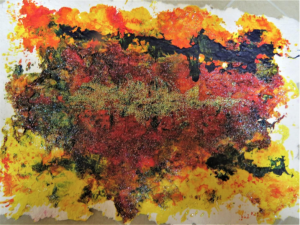
How do ideas come to be planted in one’s mind? By magic? I doubt that but sometimes, almost from nowhere a creative idea begins to rustle around, stirring up possibilities – slowly, gradually becoming ‘something’. Maybe it was the colors on a piece of clothing that began the process, or maybe the words to a familiar song or even a memory. The idea germinates and grows. What was nothing has become something!
Ah, the wonder of a creative moment. I am in awe as to how one’s mind works. Countless thoughts, memories, ideas in such a small space…awesome! The wonder of the human mind!
When I begin to think creatively, begin to work on a specific project, I wonder at God’s creative plan as it might have grown from a ‘light bulb’ moment. Colors blended together. Maybe some sky blue spilled across some sunshine yellow and God exclaimed. “Awesome! I’ll call it ‘green’. It’s just what I need for my next job!” Pieces of texture were added to make it just a bit more interesting. I become totally involved in the awesome concept of how color works…which I don’t really understand. Just the right color can appear simply by experimenting or maybe it was a spilled cup of paint that ran just where is wasn’t supposed to go. God might have thought, “A color for spring, another for the sky and maybe something for autumn!”
THE WONDER OF IT ALL.
Genesis 1: 1 – 2 (Amplified Bible) says, “In the beginning God created the heavens and the earth
(from nothing)
The earth was formless and void and darkness was upon the face of the deep.
(It was a waste of emptiness)
The spirit of God was hovering over the face of the waters.
(How awesome is that thought! )
This place we call home was a formless void, a place of emptiness, a pot of boiling color. And then – nothing became something. Maybe it was the Spirit who got the show on the road. Some awesome possibilities began to develop from that slow, purposeful hovering.
Time passed. The earth bubbled and boiled. The formless began to form.
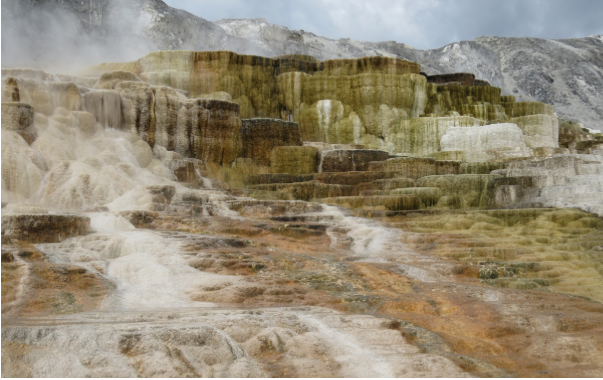
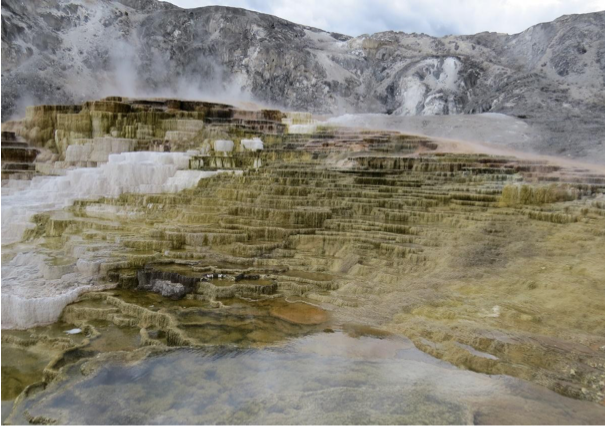
Do you know how something without form might look in the dark sky?
Do you know how the formlessness could slowly, over billions of years, come to be storm clouds and sunsets and thistles in the desert?
How did the prickly pear cactus grow as it did so that some creature might figure out just how it could actually become a meal!
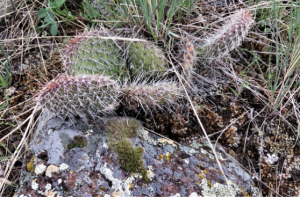
The flowers bloomed and the dew nourished their growth. Dew, raindrops, rich soil and put them all together…a delicate, lovely flower. I still remember the song from my Sunday School years…
Oh who can make a flower? I know I can’t, can you?
Oh who can make a flower? No one but God, it’s true!
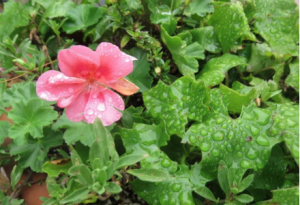
And the people danced in amazement as the world began to move away from its formlessness into something.
Creating was underway. God was working on my earthly home – the most wonderful building project ever, a world we would continue to hold in awe billions of years later.
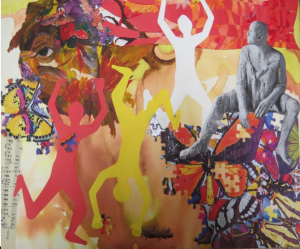
WONDER AND AWE. AWE AND WONDER!
Consider the vast space of nothing that was about to become my home. It was to be a place where the Spirit would continue to breathe life into absolutely everything. A place where even the feathers of the birds are in just the right places.

And all the fanciful creatures on land, in the air and coming up from the sea that catch our attention. The comical monkey, the soaring eagle, the mighty whale. The storm clouds of winter and the first sign of spring; the heat of the summer and the colors of autumn.
Oh, who can make my world? I know I can’t. Can you?
Oh, who can make my world? Only God, ‘tis true!
Being an artist who is quite captivated with nature, I am also in awe of the magnitude and chaos of the cosmos. I can draw a tree but God created the forest. I can paint a sunflower but God created vegetation. I am able to throw clay on my potters’ wheel to make a container but God used the clay and created humankind!
I AM FILLED WITH AWE AND WONDER!
But…I must add just one more thing. If I had been the author of Genesis I would have written about God’s palette of color. “And God said, “Wow! Look at that color. It will take their breath away!” I think God would have been so enthusiastic with each discovery, “Amazing! Look at that sunset! Orange is just the right color!”
WONDER AND AWE.
A shapeless place taking shape. Something out of nothing. Balance and order. Strength and gentleness. Large and small.
God’s creating was basically complete when the Creator stepped back, filled with awe and wonder and said, “This is good. Very Good! Wait! I have another idea!”

Want to experience more of the awe and wonder that God offers us? Check out the Gift of Wonder Online Retreat by Christine Sine. This retreat allows for 180 days of access for only $39.99 so you can move through the sessions at your own pace.
by Barbie Perks
A local pastor preached yesterday about the ambivalence some feel regarding their faith. I listened intently because he was describing exactly how I had been feeling for some time now.
A definition of ambivalence may be helpful – it is “a state of having simultaneous conflicting reactions, beliefs, or feelings towards some object. Stated another way, ambivalence is the experience of having an attitude towards someone or something that contains both positive and negative components. The term also refers to situations where “mixed feelings” of a more general sort are experienced, or where a person experiences uncertainty or indecisiveness” (quoted from Wikipedia).
We talk of walls that separate, that divide, that must come down, that must be destroyed. And at the same time we talk of walls that protect, that defend, that provide necessary boundaries to enable positive mental health.
Physical walls are built of things like bricks and mortar, wood, iron, even electric fencing. Emotional and relational walls are built through attitudes and habits, words, actions and feelings. Political walls go up every day, built with distrust and rhetoric, broken promises, selfish intentions, corruption.
Spiritual walls are built of things that are harder to define, thus so much harder to identify. And this is where the ambivalence comes in (for me anyway!) We are taught, and believe with all our hearts – God is love, God loves us, God is good – all the time. And yet, and yet…things happen, prayers are not answered, disappointment grows, doubt sets in, painful introspection follows and walls begin to grow, brick upon brick. We try to protect our hearts from the pain, the doubt. Others may sing loudly, pray lavishly, witness unendingly to God’s love and God’s goodness – and we believe them, we just don’t share the same experience. Oh we used to – we remember how we were so certain of that relationship, and we are distressed at where we find ourselves.
How do we move from this state of ambivalence, from this paralysis of faith and doubt, and hiding behind the wall? Adam and Eve tried to hide from God and discovered it didn’t help. I’ve tried to hide from God, and discovered He is still there, He doesn’t leave me alone. Just the other day He reminded me that my walls need to come down just like the walls of Jericho had to come down. I was walking in a misty drizzle and had a vivid mind picture of clay bricks baking in the sun, and how they were being softened by the mist falling. What a powerful picture of the softening power of the Holy Spirit!
We’ve seen the images beamed across the world of the flattened buildings of Turkey and Syria, walls that shattered and came crashing down with such awful loss of life, livelihoods. Earthquakes are a key image in the book of Revelation, usually symbolic of elements of God’s wrath and judgment. I ask myself (because that is where I am in my faith journey at the moment) what earthquake event will it take to get rid of that wall of ambivalence that is interfering with my relationship with God. Jericho keeps coming to mind – identify the wall, and the bricks that built it, circle the wall, repeatedly, if need be, blow the trumpets, see the wall come down, step over the rubble, step into the land of promise, the land of freedom, the land of grace, the land of hope.
May the Holy Spirit of God continue to drizzle His softening mist into our lives, guiding, blessing, and leading us into a fuller walk with Him.
 We all need the Wholeness of God…this resource includes reflections and activities for coping and thriving during the COVID-19 challenges in search of shalom as well as hope for restoration after this period of social distancing.
We all need the Wholeness of God…this resource includes reflections and activities for coping and thriving during the COVID-19 challenges in search of shalom as well as hope for restoration after this period of social distancing.
by June Friesen
As we anticipate the celebration of Christ’s resurrection I have been continually reminded of the opportunity this gives us in the Christian faith to ponder new life, a life that is different than it was before. Indeed Christ’s life was different after the resurrection as now he no longer had the humanity issue of sin holding onto His power. He had conquered the ‘death power’ of sin over His human form as well as opened an opportunity for humanity to now embrace a spiritual life in a new way. When one takes advantage of this opportunity that Jesus offers it holds untold gifts, the greatest being the promise of eternal life in heaven. However, in this world discouragements arise and at times they can become overwhelming. Let me share a couple of Scriptures.
1 John 2:24-25
Stay with what you heard from the beginning, the original message. Let it sink into your life. If what you heard from the beginning lives deeply in you, you will live deeply in both Son and Father. This is exactly what Christ promised: eternal life, real life!
Philippians 2:5-16
5-8 Think of yourselves the way Christ Jesus thought of himself. He had equal status with God but didn’t think so much of himself that he had to cling to the advantages of that status no matter what. Not at all. When the time came, he set aside the privileges of deity and took on the status of a slave, became human! Having become human, he stayed human. It was an incredibly humbling process. He didn’t claim special privileges. Instead, he lived a selfless, obedient life and then died a selfless, obedient death—and the worst kind of death at that—a crucifixion. 9-11 Because of that obedience, God lifted him high and honored him far beyond anyone or anything, ever, so that all created beings in heaven and on earth—even those long ago dead and buried—will bow in worship before this Jesus Christ, and call out in praise that he is the Master of all, to the glorious honor of God the Father. 12-13 What I’m getting at, friends, is that you should simply keep on doing what you’ve done from the beginning. When I was living among you, you lived in responsive obedience. Now that I’m separated from you, keep it up. Better yet, redouble your efforts. Be energetic in your life of salvation, reverent and sensitive before God. That energy is God’s energy, an energy deep within you, God himself willing and working at what will give him the most pleasure. 14-16 Do everything readily and cheerfully—no bickering, no second-guessing allowed! Go out into the world uncorrupted, a breath of fresh air in this squalid and polluted society. Provide people with a glimpse of good living and of the living God. Carry the light-giving Message into the night so I’ll have good cause to be proud of you on the day that Christ returns. You’ll be living proof that I didn’t go to all this work for nothing.

I have chosen to place this photo next as it really was a scene in the sky that brought the title of this writing to my spirit. Recently I was out for a walk with my dog Sasha. It was a blustery, cloudy day with a few sprinkles of rain intermittently. I often glance upwards, not too long, as that can be disastrous if there is an unexpected obstacle in my way. I noticed that the sun was really present although hidden. The wind was blowing and the clouds were on the move – and I noticed that depending on the thickness of the clouds the sun was more visible at times than others. Immediately my mind said, “Well, that is a great example of the Son. He is up in the heavens too, too far for the human eye to see. At times He is more present in my life than He is in others – but He is always there.”
Hebrews 13: 5-6 says, “ Don’t be obsessed with getting more material things. Be relaxed with what you have. Since God assured us, “I’ll never let you down, never walk off and leave you,” we can boldly quote, God is there, ready to help; I’m fearless no matter what. Who or what can get to me?” As I pondered the presence of God 24/7 and how at times I am so aware and at other times I forget that He is present – again I learned a new way to embrace God each and every day and in each and every situation/circumstance.
JESUS – BRINGS OPPORTUNITY FOR NEW BEGINNINGS!
New opportunities!
New beginnings!
Sometimes they come daily.
Sometimes they come hourly.
Sometimes they come weekly.
Sometimes they come yearly.
Sometimes they are marked by segments of years, accomplishments, goals etc.
Sometimes they are affected by one’s choices –
Sometimes they are affected by choices others make –
Sometimes they are affected by mistakes one makes –
Sometimes they are affected by the mistakes another makes –
Sometimes they come as surprises –
Sometimes they come because they were earned –
Sometimes they are rewards of one’s efforts –
Sometimes they can be the result of a loss –
Sometimes they may be the result of an addition –
Sometimes (you fill in the blank) ___________ –
Jesus You walked this earth to offer humanity a new opportunity –
A new way to know God our Creator –
A new way to have a meaningful relationship –
But –
Sometimes we feel as if we are not worthy –
Sometimes we feel as if we need to earn it –
Sometimes we feel as if it is only for others –
Sometimes we feel as if we can never be good enough –
Sometimes we feel as if we have totally blown it –
And You reply –
“My child:
I love you just as you are,
I love you in spite of all your mistakes,
I love you in spite of all of your flaws –
Physical, mental, emotional and spiritual –
I love you just as you are.
No money, trillions, billions or millions is needed,
I demand no retribution for the past,
I accept you now, this moment just as you are –
Broken, bleeding, hurting, dying,….
Come my child, there is a change about to happen for you –
A kind of metamorphosis I call it –
A change that I will begin on the inside –
And then it will come out and be revealed to others –
Oh, at times it will seem as if the Son is far away,
At times the clouds of the world will try to hide His presence,
But take some time and ponder –
And look heavenward and see and know
Just as the sun is sometimes bright, sometimes hidden or totally hidden
It still is present and still warms the earth –
So you too my child –
Look heavenward –
See beyond the clouds and skies –
And remember –
“Look to the heavens from where all of My help comes from now and forever. Amen”
And there you have it – a recipe for beginning new!
Writing and photos by June Friesen. Scripture is from The Message translation.

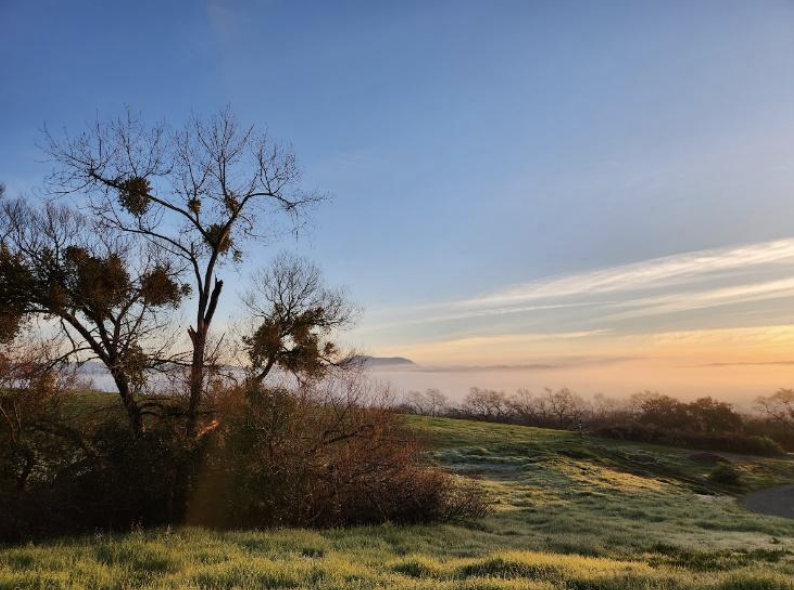
 Did you know that alongside Christine Sine’s book The Gift of Wonder, we have many resources available to you? The free downloadable bonus packet or beautiful prayer cards featuring prayers from the book, for example – something to hold and behold! Or perhaps you’d like to journey through the book alongside a retreat – we have that too! You can check it all out in our shop!
Did you know that alongside Christine Sine’s book The Gift of Wonder, we have many resources available to you? The free downloadable bonus packet or beautiful prayer cards featuring prayers from the book, for example – something to hold and behold! Or perhaps you’d like to journey through the book alongside a retreat – we have that too! You can check it all out in our shop!
by Christine Sine
What on earth are we doing to creation? We have disrupted the ecological balance of all God created on earth, and we owe it to God, to each other, and to all species to restore the balance. This is the greatest physical and spiritual challenge humanity has ever faced together. Caring for creation is key to receiving the full blessings of the Creator. Awareness of the Infinite opens us up to protecting the immediate – the very planet on which we live.
I read this quote from the Eco Bible : Volume One: An ecological Commentary on Genesis and Exodus, by Rabbi Yonatan Neri, and Rabbi Leo Dee, just after reading this very sobering article: A Clear Message from Science in the Climate Forward Newsletter from the New York Times about the latest report from the U.N. Intergovernmental Panel on Climate Change. The report states that we probably only have a decade in which to secure a sustainable and livable future for our planet.
We feel overwhelmed by this challenge and think there is little we can do, yet as Christians we are perfectly positioned to make a difference. Rabbi Yonatan Neri, and Rabbi Leo Dee in the Eco Bible quote Gus Seth, former dean of the Yale School of Forestry and Environmental Studies as saying:
I used to think that top global environmental problems were biodiversity loss, ecosystem collapse and climate change. I thought with 30 years of good science, we could address these problems, but I was wrong. The top environmental problems are selfishness, greed, and apathy, and to deal with these we need spiritual and cultural transformation. And we scientists don’t know how to do that.
Climate change requires spiritual transformation. We need to transform our view of the Bible to see the ecological underpinnings of the story. Pope Francis voices a call for repentance, extremely important during this season of Lent, that requires reconciliation with creation.
“We come to realize that a healthy relationship with creation is one dimension of overall personal conversion, which entails the recognition of our errors, sins, faults and failures and leads to heartfelt repentance and desire to change. (Pope Francis in the papal encyclical Laudatory Si)
Centuries before that, the apostle Paul asserted that the call to turn towards God, is entwined with God’s regenerative activity through Christ in “new creation”, reconciling the world and all that it contains to Godself. Pauline theology focuses on the world-transforming act of God in Christ, an act with cosmic dimensions and implications. In 2 Corinthians 5:20 we read:
So if anyone is in Christ, there is a new creation: everything old has passed away: see, everything has become new! All this is from God, who reconciled us to himself through Christ, and has given us the ministry of reconciliation; that is, in Christ God was reconciling the work to himself.
The gospel of John also seems to have an ecological focus. Some scholars see it as rewriting the Genesis story of creation in all its glory, ending with the birth of the new creation. Like the book of Genesis is starts with the words “In the beginning” and ends with Mary’s confusion as to whether he is the gardener, followed by his appearing to the disciples in all his resurrected glory. Here too there is a garden, and Jesus is its gardener. This was the focus of the retreat I conducted on Saturday. The creation story of Genesis moves from a garden paradise to our present world of pain and suffering. Jesus walk from Gethsemane to Easter moves from a garden of pain and suffering to one of resurrection and new life. (The Garden Walk of Holy Week)
What I love about living in Seattle is that spring emerges as Easter approaches. All around me as signs of new life, of new creation. I read about the death and resurrection in the Bible, but in the bursting forth of spring I experience it.
When we grab hold of these truths, our worldview is changed and we are compelled to take action to make a difference. And we can make a difference. It is probable that the Paris Accord of 2015 restricted the predicted 4-5C rise in temperature to the current 1C rise. Though change is needed at a government and corporate level to keep that from rising further, there are still things that all of us can do to make a difference. Some are very simple. Some require sacrifice. Heidi Roop in her book The Climate Action Handbook has great suggestions for ordinary people like you and me. “From food and fashion choices, rethinking travel, greening up our homes and gardens, to civic engagement and championing community climate planning, Dr. Heidi Roop shares 100 wide-ranging ways that readers from all walks of life can help move the needle in the right direction. ” Some are within the each of all of us – like using the cold cycle on our washing machines and reducing our driving speed. Others like electric cars and solar panels are a little more challenging.
We can all make a difference in God’s world and move toward the completion of God’s new creation. which came into being at the resurrection of Christ. How exciting and yet how challenging that is.
NOTE: As an Amazon Associate I receive a small amount for purchases made through appropriate links. Thank you for supporting Godspace in this way.
One of our writers, Jeannie Kendall, has written a wonderful series of poems that reflect “voices” from each section of text from Luke’s gospel. She has generously offered for anyone to use for daily readings or a resource, but please attribute her as an author if you use them. Her poetry from the first chapter is included below, but the full document with poems for the entire book can be found in a link at the bottom of this post, as well as under our Prayer, Practices, & Directions resource page.
Luke 1:1-4
The voice of Luke
I am no writer.
Words are not my medium,
But stories are.
I listen to my patients
Hear their pain and fear,
Do my best to diagnose,
And, if I can,
Alleviate their suffering.
This story
I have to share.
My own Physician
Has made his analysis
Of all that ails me
And brought me
Wholeness
I had never known.
Luke 1:5-25
The voice of Zechariah
I felt less of a man.
Not because I could not
Give her a child –
Though that was painful
Beyond explanation.
No, it was because
I could not reach her.
Each month
I saw her retreat,
Withdraw into
Some internal
Place of pain,
Somewhere
I could not decide
If I was unwelcome
Or simply unable to go
Into its depths.
But I had my work;
A place to feel worthy,
Somewhere
To drown out
My inner voices
Of accusation.
So when that one-time
Invitation came
To burn the incense
I left, trying to disguise
My relief at a respite
From the shroud of sadness
Encompassing our home
And the sense of failure
Which was nipping
At my heels
Like a wild dog.
And as I spoke
My words of farewell
I little realised
They were the last words
I would speak to her
For many months,
And that God was about
To change the world
Not just for us
But for everyone,
And for all time.
Luke 1:5-25
The voice of Elizabeth
In the end
It is easier
To let go
Of hope,
To simply uncurl
Your fingers,
And gently
Let it drop
Into the abyss
Of might-have-beens,
Feeling its absence
Almost
As a kind of peace.
And now he stands
Gesturing like a madman
Or a fool.
Yet somehow
I see the light of heaven
In his eyes
And I wonder
If I have the courage
To let hope
Be reborn.
Luke 1:57-80
The voice of Zechariah
My boy:
Words I thought
I would never say.
A day I thought
I would never see.
Our John:
Yet not ours:
Even the name
Not of our choosing
Yet we do not mind,
Glad simply
To be a part of God’s plan.
God’s spokesperson:
And as he grows
And I see the Spirit
In his eyes
I fear for his future:
An audacious prophet
Is so rarely
Welcome
And truth
Does not always
Bring acceptance.
The full text can be accessed as a pdf here:
Luke’s Gospel in Poetry
~ Goodfellow
Explore the wonderful ways that God and God’s story are revealed through the rhythms of planting, growing, and harvesting. Spiritual insights, practical advice for organic backyard gardeners, and time for reflection will enrich and deepen faith–sign up for 180 days of access to work at your own pace and get ready for your gardening season.
As an Amazon Associate, I receive a small amount for purchases made through appropriate links.
Thank you for supporting Godspace in this way.
When referencing or quoting Godspace Light, please be sure to include the Author (Christine Sine unless otherwise noted), the Title of the article or resource, the Source link where appropriate, and ©Godspacelight.com. Thank you!



